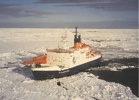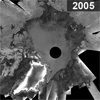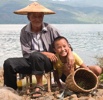 More on the Arctic melt: the National Snow and Ice Data Centre updates its commentary on this year’s record ice minimum. As of yesterday, the five day moving average of ice was still moving downwards, but slowly. Their comment on the North West Passage is interesting.
More on the Arctic melt: the National Snow and Ice Data Centre updates its commentary on this year’s record ice minimum. As of yesterday, the five day moving average of ice was still moving downwards, but slowly. Their comment on the North West Passage is interesting.
The main, deep channel of the Northwest Passage (Lancaster Sound to M’Clure Strait) has been open, or nearly ice-free, for about five weeks (since August 11, approximately). Of note is the northernmost ice edge ever recorded, at 85.5 degrees North, near the 160 degrees east longitude line.
Meanwhile, the RV Polarstern (see pic), near to completing a voyage through the Arctic as a contribution to International Polar Year, reports that large areas of this year’s ice have only been 1m thick – a 50% reduction on only 6 years ago. When the ship got close to the pole, it started raining. Ursula Schauer wrote (in early September):
A whole day of rain within 150 km of the North Pole came somewhat as a surprise! For the past few weeks, one low-pressure system after another has continuously carried warm air from northern Siberia (15°C at the Lena estuary!) towards the central Arctic Ocean. In this way the sea ice disintegrates more and more right before our eyes.
Meanwhile, I’ve bet Stoat (aka William Connolley) that 2008 will beat 2007’s record low. But only £10…




